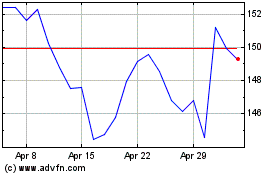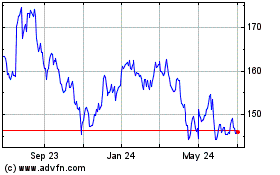J&J Case Damages Slashed By Judge -- WSJ
January 18 2020 - 3:02AM
Dow Jones News
By Peter Loftus
This article is being republished as part of our daily
reproduction of WSJ.com articles that also appeared in the U.S.
print edition of The Wall Street Journal (January 18, 2020).
A Philadelphia judge has reduced the amount of punitive damages
Johnson & Johnson must pay in a lawsuit over its antipsychotic
Risperdal to $6.8 million from the $8 billion awarded by a jury in
October.
The decision stems from a jury's decision to award $8 billion in
such damages to a Maryland man who said his use of Risperdal as a
child caused enlarged breasts and said J&J failed to properly
warn of this risk.
J&J had asked for the amount of punitive damages to be
reduced, arguing they were excessive and disproportionate to the
$680,000 in compensatory damages awarded to the man, Nicholas
Murray, in the case. Judge Kenneth Powell of the Philadelphia Court
of Common Pleas entered his order reducing the amount in the court
docket Friday.
J&J said in a statement the judge "appropriately reduced the
excessive punitive damages award," but it will continue to pursue
an appeal of the verdict. J&J said it appropriately outlined
the benefits and risks of Risperdal.
Thomas Kline, an attorney for Mr. Murray, said the judge's
reduction "wipes out a valid award of a jury" and fails to punish
corporate misconduct. Mr. Kline said he plans to appeal the
reduction and seek to reinstate the $8 billion award.
The $8 billion verdict had been the biggest to date among
lawsuits by about 13,000 plaintiffs alleging that Risperdal caused
a condition called gynecomastia in boys, which involves enlargement
of breast tissue. The lawsuits generally claim that J&J was
aware of the risk of this side effect, but understated the risk to
doctors. J&J has denied the claims.
J&J has had a series of costly legal setbacks. In August, an
Oklahoma judge ordered the company to pay $572 million for
contributing to the state's opioid-addiction crisis. Overall,
J&J is facing lawsuits from about 100,000 plaintiffs over the
safety and marketing of a range of products including Johnson's
Baby Powder, opioids and medical devices.
Mr. Murray said his use of Risperdal between 2003 and 2008
caused gynecomastia. In 2015, a Philadelphia jury awarded Mr.
Murray $1.75 million in compensatory damages, which a judge reduced
to $680,000. A punitive-damages phase of the trial started in
September and led to the $8 billion verdict.
J&J said it was precluded from presenting a meaningful
defense due to the court's exclusion of key evidence.
Risperdal, which treats schizophrenia, bipolar disorder and
irritability associated with autism, was one of J&J's
highest-selling products before losing its U.S. patent exclusivity
in 2008.
Write to Peter Loftus at peter.loftus@wsj.com
(END) Dow Jones Newswires
January 18, 2020 02:47 ET (07:47 GMT)
Copyright (c) 2020 Dow Jones & Company, Inc.
Johnson and Johnson (NYSE:JNJ)
Historical Stock Chart
From Mar 2024 to Apr 2024

Johnson and Johnson (NYSE:JNJ)
Historical Stock Chart
From Apr 2023 to Apr 2024
